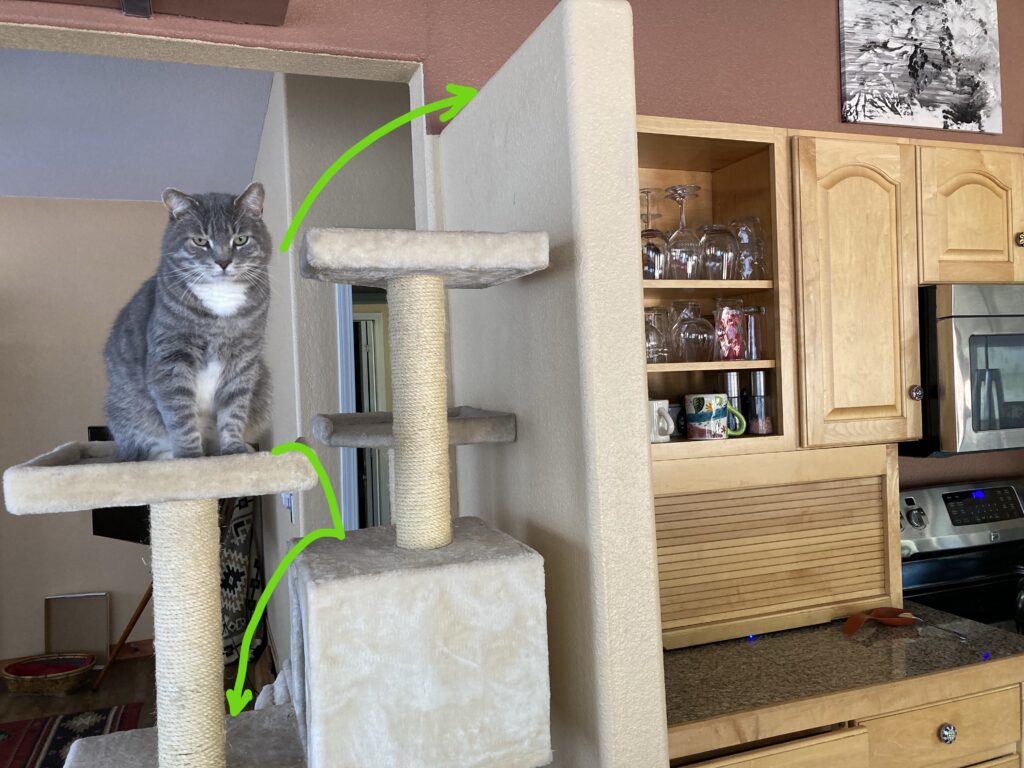
The doorbell rings and your cat runs and hides under the bed. You answer the door and your friend comes in. After some small talk, she says “By the way, how is Fluffy?” You explain that Fluffy is fine and is hiding – she just isn’t a very friendly cat.
The cat afraid of strangers may freeze or feel she has to protect herself with her claws and teeth during her veterinary exam. Medication and training help but these will work better if your cat has some ongoing positive or at least neutral experiences with strangers.
Socialization for the cat afraid of strangers
Kittens handled gently and appropriately by a variety of humans when they are 2-7 weeks old (the sensitive period) quickly learn to accept people and enjoy being with them.
That is fine and good you say, but my cat is older now and I don’t have a time machine. It is true that we can’t have the same impact on an older cat as a kitten. However, we can still provide the older cat positive, predictable experiences with humans in and outside the cat’s household.
Ways to Socialize the cat afraid of strangers
Safe Places
Consider having some high perches or maybe a cat tree in your living room. Cats are curious folk and want to satisfy their curiosity if they can do it safely. A high perch or cat tree allows a cat to CHOOSE to interact or not.
CAT guidelines – Rules for Humans!
If a cat anticipates that a human will treat her in a positive and predictable way, she will be more likely to interact with that person. The CAT human-cat interaction guidelines developed at the Battersea Dogs and Cats Home, aim to make cats more comfortable when interacting with us and are easy follow.
Point out these guidelines to guests and ask that they follow them. The video version may be more appealing to children. After a few experiences of visitors seemingly ignoring your cat, she may start to show up when strangers come over.
Desensitizing Your Cat to the Sound of the Doorbell
Doorbells can be noisy and startling. After all, doorbells are designed to alert us to deliveries or the arrival of visitors.
- Record the doorbell sound on your phone.
- Lure your cat to her high perch or cat tree in the livingroom.
- Play the doorbell sound at a very low volume and offer her a high value treat.
- Lure her down with target stick or treat. Repeat.
Gradually increase the volume of the doorbell sound over time. The doorbell will still be an unexpected noise but now has a positive association with it. You can also use the doorbell sound to cue your cat to go to her safe place (very useful if you have a door-dashing cat).
The Calm Before The Storm
For big holiday gatherings, you may also want to consider giving the cat afraid of strangers a supplement such as Zylkene or Anxitane a few days before the big event. These non-prescription supplements can make your kitty feel calmer when lots of unfamiliar humans are around.
Regular veterinary care is an essential part of a long and pain-free life for your cat. Regular visits can head off problems and spread veterinary costs out over time. Desensitizing your cat to strangers can help reduce his fear and anxiety at the vet clinic, making it easier to take him to the vet.
If you have concerns about how your cat is handled at the veterinary practice, consider taking your cat to a Cat Friendly practice, where staff is trained in feline handling techniques.
This is the final post in the “Better Vet Visits for Your Cat” series. I hope you try some of the techniques suggested in these posts. Remember to break things up in simple steps that your cat can understand and master. And, always try to see things from the “feline purrspective”.

